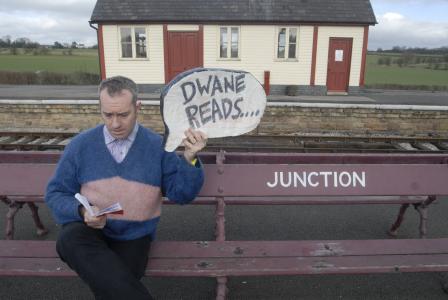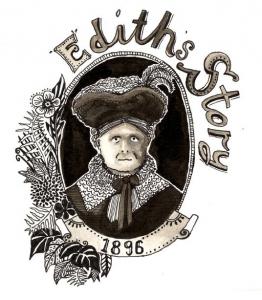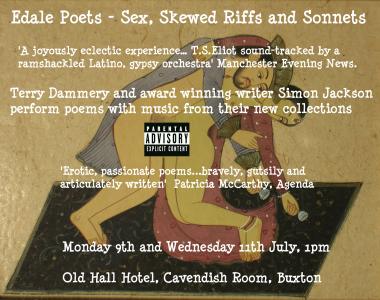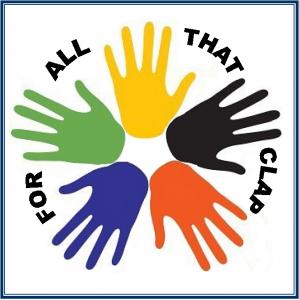Spoken Word Reviews
DWANE READS.... BIG BET BOY & OTHER CRAZY FOOLS - Dwane Reads

Ever played poetry bingo? Well, you can with Dwane. In a twist reminiscent of Elvis Costello's wheel of fortune concerts, he gets his audience to call out a number and then reads that one from his big book of poems. It can lead to interesting conjunctions of poems or in our case a slightly disconcerted Dwane having to read one of his darkest poems straight off!
Dwane is a natural storyteller and indefatigable performer. Up at Poole's Cavern, he didn't have much of an audience but it didn't affect his energy levels and the effort he put in to the readings. I was pleased as I crested the Slopes later in the day to see a substantial knot of people gathered round him on the Opera House forecourt, not to mention those nursing a pint over at the Old Clubhouse and listening in. Between those performances Dwane had been in and around Pavilion Gardens talking to people, getting them to choose the numbers and reading his poetry.
The poetry itself is written to be performed and is full of characters and issues; there are a series of poems about the Big Bet Boy, 53 years old and still living at home with his mother, being entrusted with the rent money and squandering it down at the bookies - political poems, "Shop's Gone" is about the decline of the High Street which would have rung a bell with many in Buxton who objected to another Tesco - domestic poems, "Shouty House" is about living in a noisy house with kids (I live in one of them too) - and romance too in "Helen", a touching poem about his wife.
It's the stories where he is best; the darker poem "You could hang for that" is inspired by Victorian tales of shadowy characters entrapping children to be used in nefarious schemes and experiments, and "Wheelbarrow Man" about a community of chickens that appeared on a roundabout and the old man who took it upon himself to feed them.
To my mind what Dwane does is very much the spirit of fringe festivals, taking your art, in this case his poetry, and going out there to find an audience and engage with people.
Steve Walker
EDITH'S STORY - Scrivener's Books & Bookbinding

Scrivener's plays host to a ghost. A gentle ghost story written and told by Alastair Scrivener and illustrated by Katie May, and both are present at the telling. The story centres on an ancestor of Mr Scrivener who is reputed to have made a number of appearances in the shop. The talk takes you through the shop and some of its history from the late 19th century when Edith arrives of the scene.
We were made most welcome, including my toddler, and all enjoyed the story. Copies are available for purchase in the shop afterwards and there is also the opportunity to see some of the original artwork.
Ian Parker Heath
PRUFROCK'S WORLD - John Rainer

Quite why writers or composers go in and out of fashion is hard to explain. In the case of TS Eliot perhaps his unsought association with Cats did his credibility no favours. On the other hand the difficulty of his later work and the charges of anti-semitism don't help. All of this, no doubt, is a great shame if it deters people from reading his earlier poetry.
Prufrock and Other Observations includes some of TS Eliot's most accessible and memorable work and John Rainer's account of it has dramatic and physical force.
Written when still in his early 20s Prufrock represents an external, physical world that is now well past but Eliot's verse famously brings back the smells, the darkness, the decay:
The winter evening settles downWith smell of steaks in passageways.
Six o'clock.
The burnt-out ends of smoky days.
If the physical landscape is oppressive there is little cheer to found in the mind or body of Prufrock. He seeks solace and comfort in the mundane: in tea and cakes and marmalade, but to no avail.
They are rattling breakfast plates in basement kitchens,
And along the trampled edges of the street
I am aware of the damp souls of housemaids
Sprouting despondently at area gates.
Twisted faces from the bottom of the street,
And tear from a passer-by with muddy skirts
An aimless smile that hovers in the air
And vanishes along the level of the roofs.
An hour with Prufrock and with Eliot could not be an entirely comfortable experience and some might ask what distinguishes this from a radio programme? The fact is, however, that John Rainer inhabits the personality and verse of Prufrock. This show might be just a prodigious feat of memory but John Rainer gives life to the verse and the characters found there.
If the general tone is of desolation and despair Rainer also finds lightness and a certain grim humour in poems such as Aunt Helen or Hysteria.
Enjoyable isn't quite the right word but Prufrock's World is a highly recommended exploration of how people can become trapped physically and emotionally. Prufrock resonates still almost 100 years after his creation.
Keith Savage
QUARTET À TÊTE - Edmund Bealby-Wright

On Tuesday 10th July 2012 seventeen people had the exhilarating experience of listening to extracts from Edmund Nealby - Wright's novel,' This Farewell Symphony' interspersed with music by Haydn.
The book is structured in four movements with the titles Head, Senses, Manners and Fun. Arguably these are appropriate titles for the vast majority of classical symphonies. The book is about a journey undertaken by the widower Edward and his two young children. They go on a trail of places which are significant to Haydn in his lifetime.
During the evening the audiences are also taken on a journey through the readings and music of Haydn. The journey starts at Rohrau, Haydn's birth place and to St Stephens in Vienna, to Esterházy, to London and back again to Vienna where Haydn died in 1809. The journey involves much factual information such as his unhappy marriage and him having to keep in well with his employer by writing lots of pieces for the baryton for Nikolaus Esterházy to play. Interesting ideas emerged such as the anxiety a father may have had about the possibility of his son being castrated which may have happened to Haydn to avoid his voice breaking. A humorous comparison between how roast pork was invented and how the string quartet came about; the former by the tragedy of a fire and the latter by the misfortune of not having a keyboard present. A macabre incident and very true was that Haydn's head was removed from his body by scientists interested in studying the shapes of skulls of gifted people. It was not returned to his body until 1954.
The music of Haydn was from his string quartets which included movements from his opus 76, 54, 20 and 17. It also included a sonata movement for a baryton, folk music of the day and a movement from Tomasini. The music was played by a quartet formed by members of London's top early music groups. The violinists in the group were Sophie Barber and Sarah Bealby-Wright, the viola player was Katie Heller and Ruth Alford played the cello. For a group who had not been together very long they played very much as an entity showing rhythmic strength especially in the gypsy music and a great deal of sensitivity especially in the opus 20 no. 4, 2nd movement.
All the people I spoke to were impressed with the performance and many of the audience will be inspired to read the book.
Roger Horvath
SEX, SKEWED RIFFS AND SONNETS! - Edale Poets

This was a heady brew for a Monday lunchtime and I had to lie down for a while before committing finger to keyboard. But I've got more notes for this show than anything else I've reviewed this Fringe. That must mean something. It is going to be difficult to write this without some use of what is still called the 'F word'. I think these pages are generally uncensored - let's see.
Simon Jackson began the programme reading for his collection of poems Fragile Cargo. Now Simon seems to have had interesting life: his poems drew on adult experiences in war-torn Belgrade, Peru and Edinburgh - as well as childhood holidays in Pembrokeshire. Some of his poems clearly address human physical and emotional displacement and the uncertainties that follow. In such situations who or what can we cling to? Others are lighter in tone - but that doesn't make them frivolous. So, experiences as a child seeking out nude sunbathers amongst the Pembrokeshire dunes or, as a primary school teacher leading sex education lessons, provide poetic opportunities to explore social and moral boundaries and ask "Where do those boundaries come from - and should we accept them?"
Terry Dammery then read from his collection Love in the Vernacular and according to the Fringe programme he "guaranteed to spice up your sex life". Know your audience Terry before making such promises, thank you very much. Anyway anyone who recoils at the thought of middle-aged people being physically spent from exhaustive and passionate bouts of intense sexual activity probably should avoid Terry's reading. At one point he said, "I need a drink". A lady just in front whispered (quite loudly) "You're not the only one." This might be 50 Shades of Grey (but without the S&M - not sure what that leaves actually).
Terry kicked off with a poem inspired by an idea taken from Wordsworth called "Fuck the daffodils." Another poem about sex of Olympic proportions owed something (the title) to Edward Lear. You've probably got the idea by now. Terry might get nominations for the Bad Sex writing award but there is always what appears to be what Ivor Cutler used to call "a grim twinkle" in his eyes. If you go and hear Terry make a conscious choice - do you want your partner with you or not?
Simon returned and performed (I hope a better choice of word than merely 'sung') some songs from a recent CD. Some of the material is explicitly political in terms of its reflections on the state we live in. He cheerfully acknowledged pinching the punk chorus "War - what is it good for? It is good for business". Another song - "Crow" - considered how our lives are increasingly shaped by greed, personal darkness and a scavenging mentality. Simon coped well with the technical challenges thrown at him by the PA.
This show is only £3. You'll have a laugh or two or three. You might wince a bit as well. You might start to reckon up how many hours of lovemaking you have left. (Not this reviewer I hasten to add). You can see it on the 11th before they head north. What other way would you spend a lunch hour?
Keith Savage
THE 5TH FESTIVAL FRINGE POETRY SLAM - Word Wizards

I had never been to a poetry slam before so my first question aimed at Word Wizards, Rob and Lesley Stevens was quite simple...
Just exactly what is a slam?
It's a fun event that involves three groups of people for a maximum of three minutes at a time - poets, audience and judges. Poets present their work for the audience to enjoy and the judges to score out of ten. Scores are totted up and the highest scoring go through to the next round until the audience and judges have found their favourite poet of the night.
Isn't poetry just about stuffed-shirts self-congratulating?
Not at all! Slam audience members are encouraged to show their pleasure or otherwise by using one of the many horns distributed about the venue. Laughter, giggling and heckling abound. On the night, eight poets entered and their styles varied greatly; they were soft, shouty, short, rhyming, rapping, rude, humorous, long, pacey, paced and suggestive. The results produced the same effects - emotional, powerful, entertaining, challenging, thought provoking, moving, creative and reaching out. The scoring was secondary to the enjoyment felt by the audience or as Rob puts it "The points are not the point, the poetry is the point."
That sounds like fun. How can I get involved?
Sadly, that was the only poetry slam of this year's Fringe, but you can still get involved with the Word Wizards. They meet on the last Tuesday of every month at the Buckingham Hotel, 19:30. In the meantime have a go at writing a limerick in celebration of Edward Lear's 200th birthday and email it to Rob on poetryslamuk@aol.com
David Carlisle.
UNCONVENTIONAL ATTITUDES - Vicky Ellis

Unassuming and approachable, Vicky Ellis chatted with the front row of her audience as she waited for the 'go ahead' to begin. She looked a little nervous as she started, reading from a letter by William Hamilton describing the first time he met his future wife, Emma, in Naples.
Vicky Ellis uses simple and contemporary language to tell four stories of women from Greek mythology. Her choice of words, mannerisms and gestures together created scenes and images that took me to the shores of Naxos, the ballrooms of Naples, Daedalus' Labyrinth, a cold and windy sea port in Norfolk and more. If I closed my eyes it was better than a movie.
Vicky changes shawls between pieces. This separated the stories and gave us all a chance to draw breath. Each of the four stories is linked to episodes in Emma Hamilton's life and the manner of the performance also reflects Lady Hamilton's style of dressing when she modelled for artists, danced, acted and performed charades of mythological heroines.
It is really not necessary to know the life of (Emma) Lady Hamilton nor the Greek myths which Vicky Ellis uses in her story telling, but I found it interesting looking up bits of it later. In fact there are so many other references within this performance, it would certainly be enjoyed on different levels by artists, historians and classical scholars. I am none of these and I thoroughly enjoyed the richness of it all.
The performance is based on the 'unconventional' attitudes of the young Emma Hamilton. The style and colour of these attitudes were very much moulded by the artists and courtiers who were part of her circle but her expression of freedom was the result of events in her life; her relationship and break up with Charles Grenville, the "arranged" marriage to William Hamilton and of course her affair with Lord Nelson. The four Greek myths correlate to and give expression to these events.
It's the best thing I've seen for a long time; a refreshingly feminine perspective. I can't recommend it highly enough.
Martin Wood